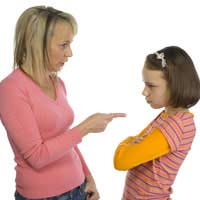Body Language And Parenting

Parenting experts and of course parents, spend a great deal of time focused on providing proper food, shelter, discipline, education, and the like for their children. All of these things are important, but what’s often overlooked is the role body language plays in these parenting activities.
How You Use Body Language Can Be More Important Than What You Say
Some parents spend so much time telling their children what to do, how to behave, and such, that they forget one of the most important aspects of parenting – their own behaviour. Children respond more consistently and more actively to what a parent does than what a parent says.Body language is an integral part of this because children are naturally good at noticing non-verbal cues. And when a parent’s words convey a different message than his or her non-verbal behaviours, guess which message the child is most likely to believe? That’s right, the non-verbal one.
So for instance, if a mum tells her daughter she did a good job dusting but while she’s saying it she has a frown on her face and is running her fingers across surfaces to check for dust, the words are all but lost. The mum might think she’s giving positive feedback, but in reality, she’s giving negative feedback. The daughter will eventually learn to ignore what is said and absorb the non-verbal, negative message.
Areas of Parenting Where Body Language Has An Influence
Research is increasingly demonstrating the broad range of areas where body language has a profound influence on parenting. Some examples include:- Goal setting – Parents can demonstrate non-verbal messages that support and encourage a child to set and achieve goals.
- Work ethic – Parents can step right up and embrace work opportunities willingly, rather than delaying and sitting around avoiding work at all costs.
- Personal responsibility – Parents can demonstrate personal responsibility in many ways, such as using a rubbish bin instead of walking past & pretending not to see it.
Parental Body Language And Children Of Different Ages
Nature has pre-programmed children to respond to body language, especially newborns and infants. When a parent smiles, claps, shakes their head no, and the like, babies quickly learn what message is being sent.Toddlers and pre-schoolers will test the messages sent by body language, just to see if the parent really means it. For instance, if a father holds out the palm of his hand in a gesture telling the child to stop and wait, the child might ignore it and try to run away. Dad then reinforces the non-verbal 'stop' gesture by taking the child’s hand and shaking his head back and forth, communicating very clearly that the original non-verbal message must be obeyed.
With school age children and pre-teens, a parent’s body language can have a strong influence on how a child perceives gender roles. For instance, if mum shows disapproval when her daughter digs in the dirt but approval when her son does the same thing, each child begins to notice what the parent perceives as appropriate behaviour based on gender.
Perhaps the most striking example of body language and parenting occurs when grandchildren come along. Suddenly, parents who previously had to enforce discipline and rules have the freedom to show unconditional love, acceptance, and emotion. There is nothing more encouraging or rewarding to a child than a grandparent who smiles and claps at something the child does.


Re: Changing Gender Roles
(palimpsests). In the XIII-XV centuries in
Re: Communication - What Percentage is Body Language?
Vertyowdiwjodko kofkosfjwgojfsjf oijwfwsfjowehgewjiofwj jewfkwkfdoeguhrfkadwknfew…
Re: Changing Gender Roles
(palimpsests). In the XIII-XV centuries in
Re: Asperger's Syndrome and Learning Body Language
I have a son that has Aspergers. I believe in the concept of learning body could help these people. I also…
Re: Body Language Questionnaire: How to Tell If Someone Likes You
I strongly recommend Leonardomitnickhacking@gmail. com to you all. He can help you to…
Re: If a Person Sits on One Leg, What Does This Mean?
No deep psychological reason for using this position. Im 4'10". Hate my legs dangling. It cuts my…
Re: Body Language of an Abuser
Totally agree with the other poster. And truly, "Perhaps if women were more aware of these indicators, abuse statistics could be…
Re: The Role of Body Language in Communication
People do not respond or react towards other people body language. We sometimes take it the wrong way when…
Re: What Do Nail Biting & Hair Twirling Reveal?
I have a very bad habit of twirling my hair, putting it in my mouth and bitting my hair off. Iv had this…
Re: Communication - What Percentage is Body Language?
i have big problem with body language and choice of my words, so i decided to listen first and then…